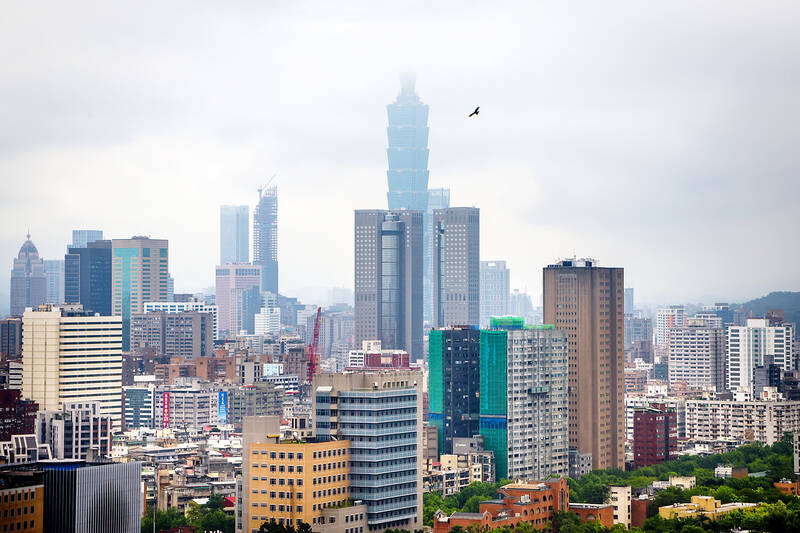Rising home prices and interest rates have prompted more people to sign up for 30-year mortgages to ease monthly debt payments, Sinyi Realty Inc (信義房屋) said yesterday.
The average mortgage length climbed to a record-high 297 months, or 24.75 years, in the fourth quarter of last year, from 291 months in the previous quarter, indicating that 30-year mortgages have become mainstream, Sinyi Realty research manager Tseng Ching-der (曾敬德) said, citing data from the Ministry of Interior’s real-estate information platform.
That means that people who buy homes at age 40 would have to pay mortgages until they turn 70, Tseng said.

Photo: CNA
Older Taiwanese liked to pay mortgages ahead of schedule to save on interest payments, but people today prefer to take advantage of Taiwan’s low interest-rate environment and extend mortgages to own a home, the analyst said.
Interest rates on mortgages were about 1.3 percent for a long time before the central bank started to tighten its monetary policy in March last year to contain inflation, Sinyi said.
Twenty-year mortgages used to be the home loan of choice and many borrowers paid way in advance, consistent with Taiwan’s high savings rates, Tseng said.
The new mindset is especially evident among young buyers of new homes in New Taipei City, Taichung and Hsinchu City, where mortgages average more than 300 months, he said.
Newly completed homes have favorable lending terms with assistance from property development companies, he said, adding that young people consider 30-year mortgages acceptable.
Rising home prices make 30-year mortgages more attractive, as they require lower monthly payments, Tseng said.
The monthly payment for a NT$10 million (US$324,538) 30-year mortgage with an interest rate of 2.06 percent is NT$37,263, much less than NT$50,873 per month for a 20-year mortgage, he said.

Nissan Motor Co has agreed to sell its global headquarters in Yokohama for ¥97 billion (US$630 million) to a group sponsored by Taiwanese autoparts maker Minth Group (敏實集團), as the struggling automaker seeks to shore up its financial position. The acquisition is led by a special purchase company managed by KJR Management Ltd, a Japanese real-estate unit of private equity giant KKR & Co, people familiar with the matter said. KJR said it would act as asset manager together with Mizuho Real Estate Management Co. Nissan is undergoing a broad cost-cutting campaign by eliminating jobs and shuttering plants as it grapples

TEMPORARY TRUCE: China has made concessions to ease rare earth trade controls, among others, while Washington holds fire on a 100% tariff on all Chinese goods China is effectively suspending implementation of additional export controls on rare earth metals and terminating investigations targeting US companies in the semiconductor supply chain, the White House announced. The White House on Saturday issued a fact sheet outlining some details of the trade pact agreed to earlier in the week by US President Donald Trump and Chinese President Xi Jinping (習近平) that aimed to ease tensions between the world’s two largest economies. Under the deal, China is to issue general licenses valid for exports of rare earths, gallium, germanium, antimony and graphite “for the benefit of US end users and their suppliers

Dutch chipmaker Nexperia BV’s China unit yesterday said that it had established sufficient inventories of finished goods and works-in-progress, and that its supply chain remained secure and stable after its parent halted wafer supplies. The Dutch company suspended supplies of wafers to its Chinese assembly plant a week ago, calling it “a direct consequence of the local management’s recent failure to comply with the agreed contractual payment terms,” Reuters reported on Friday last week. Its China unit called Nexperia’s suspension “unilateral” and “extremely irresponsible,” adding that the Dutch parent’s claim about contractual payment was “misleading and highly deceptive,” according to a statement

The Chinese government has issued guidance requiring new data center projects that have received any state funds to only use domestically made artificial intelligence (AI) chips, two sources familiar with the matter told Reuters. In recent weeks, Chinese regulatory authorities have ordered such data centers that are less than 30 percent complete to remove all installed foreign chips, or cancel plans to purchase them, while projects in a more advanced stage would be decided on a case-by-case basis, the sources said. The move could represent one of China’s most aggressive steps yet to eliminate foreign technology from its critical infrastructure amid a